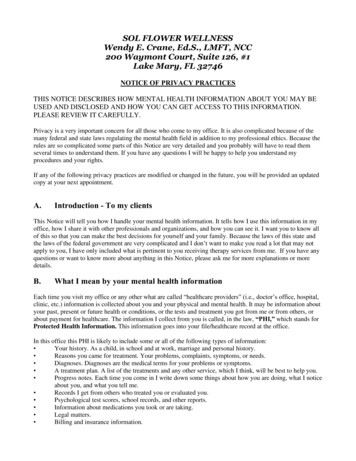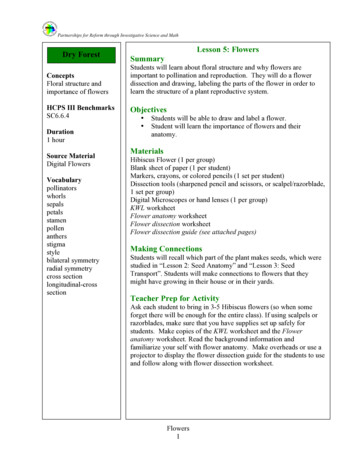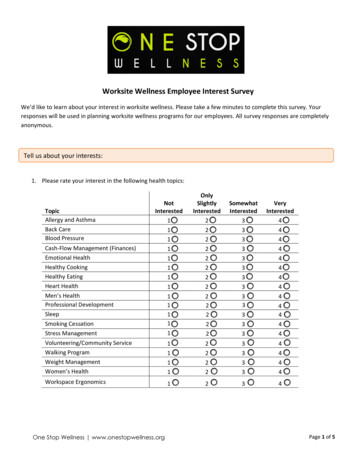
Transcription
SOL FLOWER WELLNESSWendy E. Crane, Ed.S., LMFT, NCC200 Waymont Court, Suite 126, #1Lake Mary, FL 32746NOTICE OF PRIVACY PRACTICESTHIS NOTICE DESCRIBES HOW MENTAL HEALTH INFORMATION ABOUT YOU MAY BEUSED AND DISCLOSED AND HOW YOU CAN GET ACCESS TO THIS INFORMATION.PLEASE REVIEW IT CAREFULLY.Privacy is a very important concern for all those who come to my office. It is also complicated because of themany federal and state laws regulating the mental health field in addition to my professional ethics. Because therules are so complicated some parts of this Notice are very detailed and you probably will have to read themseveral times to understand them. If you have any questions I will be happy to help you understand myprocedures and your rights.If any of the following privacy practices are modified or changed in the future, you will be provided an updatedcopy at your next appointment.A.Introduction - To my clientsThis Notice will tell you how I handle your mental health information. It tells how I use this information in myoffice, how I share it with other professionals and organizations, and how you can see it. I want you to know allof this so that you can make the best decisions for yourself and your family. Because the laws of this state andthe laws of the federal government are very complicated and I don’t want to make you read a lot that may notapply to you, I have only included what is pertinent to you receiving therapy services from me. If you have anyquestions or want to know more about anything in this Notice, please ask me for more explanations or moredetails.B.What I mean by your mental health informationEach time you visit my office or any other what are called “healthcare providers” (i.e., doctor’s office, hospital,clinic, etc.) information is collected about you and your physical and mental health. It may be information aboutyour past, present or future health or conditions, or the tests and treatment you got from me or from others, orabout payment for healthcare. The information I collect from you is called, in the law, “PHI,” which stands forProtected Health Information. This information goes into your file/healthcare record at the office.In this office this PHI is likely to include some or all of the following types of information: Your history. As a child, in school and at work, marriage and personal history. Reasons you came for treatment. Your problems, complaints, symptoms, or needs. Diagnoses. Diagnoses are the medical terms for your problems or symptoms. A treatment plan. A list of the treatments and any other service, which I think, will be best to help you. Progress notes. Each time you come in I write down some things about how you are doing, what I noticeabout you, and what you tell me. Records I get from others who treated you or evaluated you. Psychological test scores, school records, and other reports. Information about medications you took or are taking. Legal matters. Billing and insurance information.
I use this information for many purposes. For example, I may use it: To plan your care and treatment. To decide how well my treatments are working for you. When I talk with other healthcare professionals who are also treating you such as your family doctor orthe professional who referred you to me. (I will not talk to any of these individuals without your priorwritten authorization). To show that you actually received the service from me that I billed to you or to your health insurancecompany.When you understand what is in your record and what it is used for you can make better decisions about whom,when, and why others should have this information.Although your health record is the physical property of the healthcare practitioner or facility that collected it, theinformation belongs to you. You can read it and if you want a copy I can make one for you (but may charge youfor the costs of copying and mailing, if you want it mailed to you). If you find anything in your records that youthink is incorrect or believe that something important is missing you can request an amendment (addinformation to) to your record, although in some rare situations I don’t have to agree to do that. We can discusstogether what you would like to add and decide together what is best for you.C.Privacy and the lawsI am required to tell you about privacy because of the privacy regulations of a federal law, the Health InsurancePortability and Accountability Act of 1996 (HIPAA).The HIPAA law requires me to keep your Personal Healthcare Information (or PHI) private and to provide youthis Notice of Privacy Practices (NPP) outlining my legal duties and my privacy practices. I will obey therules of this Notice as long as it is in effect. However, if I make changes to this Notice, the rules of the newNPP will apply to all of the PHI that I keep. If I change the NPP I will post the new Notice in my office whereeveryone can see. You or anyone else can also obtain a copy from me at any time.In some cases, the laws in the State of Florida that govern my profession differ or are more strict regardingprivacy and confidentiality of the information you provide while in therapy with me. When this is the case, Imust abide by the law that is stricter when is comes to your protection. Please understand that I will do my bestto protect you and your information to the best of my ability as provided by law (state and federal).D.How your protected health information (PHI) can be used and sharedWhen your information is read by me and used by me to make decisions about your care, the HIPPA law termsthat “use.” If the information is shared with or sent to others outside this office, the law terms that, “disclosure.”When I use your PHI here or disclose it to others I share only the minimum necessary PHI needed for thoseother people to do their jobs, unless law or ethics otherwise directs me. HIPPA gives you rights to know aboutyour PHI, how it is used, and to have a say in how it is disclosed (shared). Thus, I have provided an outlineexplaining specifically how your information is used or shared.1.Uses and disclosures of PHI in healthcare with your consentAfter you have read this Notice you will be asked to sign a separate “Informed Written Consent forTreatment” form to allow me to use and share your PHI. In almost all cases your PHI will be used or sharedwith other people or organizations to provide treatment to you, to arrange for payment for my services, orsome other business functions called health care operations. Together these routine purposes are called TPO.The Consent form allows me to use and disclose your PHI for TPO. Take a minute to re-read that last sentenceuntil it is clear because it is very important. Next I will tell you more about TPO.Notice of Privacy Practices2
1a.For treatment, payment, or health care operations.I need information about you and your condition to provide care to you. In order to provide proper treatment, Imust have this information. Therefore you must sign the Consent form before we begin therapy. If you do notagree with the consent I cannot treat you.When you come to see me, I will have you fill out registration and consent forms, which will be kept in yourhealthcare record here. As mentioned above, PHI is used or disclosed for three purposes: treatment, obtainingpayment, and what are called healthcare operations. These terms are defined below.For treatmentI use your information to provide you with psychological treatment or services. These services might includeindividual, couple, family, or group therapy, treatment planning, or measuring the benefits of my services.I may share or disclose your PHI to others who provide treatment to you. However, due to overridingconfidentiality laws, I will not speak to anyone else without first obtaining a “release of information” form fromyou giving me permission to release such information. Once a release is obtained, those that I am likely to shareyour information with include: your personal physician, other professionals or consultants that I would refer youto for services I cannot provide. I will get back their findings and opinions and those will go into your recordshere. If you receive treatment in the future from other professionals, and they request information about youwith the proper release of information, I can also share your PHI with them. These are some examples so thatyou can see how I use and disclose your PHI for treatment.For paymentI may use your information to bill you, for you to get reimbursed by your insurance company, or to bill others sothat I can be paid for the treatment I provide to you.For health care operationsThere are a few other ways I may use or disclose your PHI for what are called health care operations. Forexample, I may use your PHI to see where I can make improvements in the care and services I provide.1b.Other uses in healthcareAppointment Reminders: I may use and disclose medical information to reschedule or remind you ofappointments for treatment or other care. If you want me to call you only at your home or your work or prefersome other way to reach you, I usually can arrange that. Just tell me.Treatment Alternatives: I may use and disclose your PHI to tell you about or recommend possible treatmentsor alternatives that may be of help to you.Other Benefits and Services: I may use and disclose your PHI to tell you about health-related benefits orservices that may be of interest to you.Business Associates. There are some jobs I hire other businesses to do for me. Under HIPPA, they are calledmy Business Associates. Examples include a copy service I use to make copies of your health records and abilling service that figures out, prints, and mails my bills. These business associates need to receive some ofyour PHI to do their jobs properly. To protect your privacy they have agreed in their contract with me tosafeguard your information.Notice of Privacy Practices3
2.Uses and disclosures that require your AuthorizationIf I want to use your information for any purpose besides the TPO or those I described above I need yourpermission on an Authorization to Release Information form.If you do authorize me to use or disclose your PHI, you can revoke (cancel) that permission, in writing, at anytime. After that time I will not use or disclose your information for the purposes that we agreed to. Of course, Icannot take back any information I had already disclosed with your permission or that I had used in my office.3.Uses and disclosures of PHI from mental health records that don’t require a Consent orAuthorization under HIPPAHIPPA allows me use and disclose some of your PHI without your consent or authorization in some cases. Hereare examples of when I might have to share your information.When required by lawThere are some federal, state, or local laws, which require me to disclose PHI. I have to report suspected child, elder, or disabled person abuse. If you are involved in a lawsuit or legal proceeding and I receive a signed court order I may have torelease some of your PHI. I will only do so after trying to tell you about the request, consulting yourlawyer, or trying to get a court order to protect the information they requested. This involves measserting, on your behalf, their right to privileged information. If you tell me or I suspect that you are going to harm yourself or someone else, I must inform the properauthorities.**The following situations are allowed by HIPPA for me to disclose your information without your consent orauthorization. However, the State of Florida laws regulating the mental health field require me toobtain your written authorization PRIOR to disclosing information to the following sources. Thus, Iwill follow state law in these cases. The following is still provided so that you may understand what isincluded in HIPPA.For Law Enforcement PurposesI may release medical information if asked to do so by a law enforcement official to investigate a crime orcriminal as the law requires.For public health activitiesI might disclose some of your PHI to agencies, which investigate diseases or injuries as the law requires.Relating to decedentsI might disclose PHI to coroners, medical examiners or funeral directors, and to organizations relating to organ,eye, or tissue donations or transplants, as the law requires.For specific government functionsI may disclose PHI of military personnel and veterans to government benefit programs relating to eligibility andenrollment. I may disclose your PHI to Workers Compensation and Disability programs, to correctionalfacilities if you are an inmate, and for national security reasons.4.Uses and disclosures where you have an opportunity to objectI can share some information about you with your family or close others. I will only share information withthose involved in your care and anyone else you choose such as close friends or clergy. I will ask you aboutNotice of Privacy Practices4
whom you want me to tell what information about your condition or treatment. You can tell me what you wantand I will honor your wishes as long as it is not against the law. I will also obtain a release of information fromyou, to also cover my legal obligations under state law.5.An accounting of disclosuresWhen I disclose your PHI I will keep records of whom it was sent to, when I sent it, and what I sent. You mayobtain an accounting (a list) of many of these disclosures.E.Your rights regarding your health information1.You can ask me to communicate with you about your health and related issues in a particular way or at acertain place, which is more private for you. For example, you can ask me to call you at home, and notat work to schedule or cancel an appointment. I will try my best to do as you ask.2.You have the right to ask me to limit what I tell people involved in your care or the payment for yourcare, such as family members and friends. While I don’t have to agree to your request, if I do agree, Iwill keep our agreement except if it is against the law, or in an emergency, or when the information isnecessary to treat you.3.You have the right to look at the health information I have about you such as your progress notes andbilling records. You may even get a copy of such record, although there will be a nominal fee for copiesmade. This information excludes “psychotherapy notes,” which are notes that I may write to record theconversation between you and I during a private counseling, group, joint or family session. The“psychotherapy notes” are protected by federal law and are for me only. If I decide to keep“psychotherapy notes,” with regards to my treatment with you, and another provider requests thesenotes, I will need to have an authorization from you in order to release this information. At this time, Ionly keep progress notes, so this differentiation is not an issue.4.If you believe the information in your records is incorrect or missing important information, you can askme to make changes (called amendments) to your health information. You have to make this request inwriting and send it to me. You must tell me the reasons you want to make the changes.5.You have the right to a copy of this notice. If we change this NPP we will post the new version in ourwaiting area and you can always get a copy of the NPP from me.6.You have the right to file a complaint if you believe your privacy rights have been violated. You can filea complaint with me and with the Secretary of the Department of Health and Human Services. Allcomplaints must be in writing. Filing a complaint will not change the health care I provide to you in anyway.Also, you may have other rights, which are granted to you by the laws of our state and these may be the same ordifferent from the rights described above. I will be happy to discuss these situations with you now or as theyarise. As mentioned above, despite the differences, I am legally bound to the law that is stricter and best servesyou regarding the therapeutic relationship.F.If you have questions or problemsIf you need more information or have questions about the privacy practices described above please speak to meas the “Privacy Officer.” If you have a problem with how your PHI has been handled or if you believe yourprivacy rights have been violated, contact the Privacy Officer. You have the right to file a complaint with meand with the Secretary of the Federal Department of Health and Human Services. I promise that I will not in anyway limit your care here or take any actions against you if you complain.Notice of Privacy Practices5
If you have any questions regarding this Notice or these health information privacy policies, please contact me,Wendy E. Crane, Ed.S., LMFT, NCC as the designated Privacy Officer, at the address listed at the top of thisform or I can be reached by phone at (407) 739-4267.Signature of ClientDate of SignatureSignature of ClientDate of SignatureNotice of Privacy Practices6
sol flower wellness wendy e. crane, ed.s., lmft, ncc 200 waymont court, suite 126, #1 lake mary, fl 32746 notice of privacy practices this notice describes how mental health information about you may be used and disclosed and how you can get access to this information. please review it carefully.










